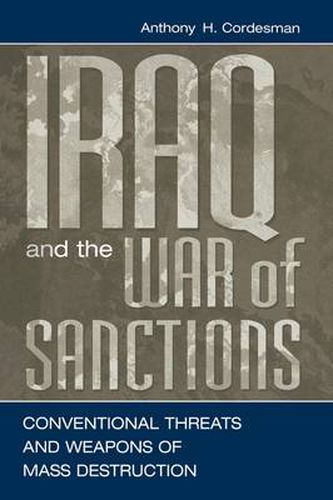Readings Newsletter
Become a Readings Member to make your shopping experience even easier.
Sign in or sign up for free!
You’re not far away from qualifying for FREE standard shipping within Australia
You’ve qualified for FREE standard shipping within Australia
The cart is loading…






Since the Gulf War, Iraq has attempted to win through confrontation, diplomacy and bluster what it could not achieve on the battlefield. Defence analyst Anthony Cordesman suggests that this war of sanctions be a struggle that Iraq has begun to win. Saddam Hussein’s regime remains aggressive and ambitious, and its military capabiliites cannot be judged solely by the current state of Iraq’s armed forces. Most dangerous of all is Iraq’s continuing effort to build an arsenal of weapons of mass destruction. Cordesman analyzes Iraqi strategic intentions and diplomatic opportunities, and assesses the options available to the international community to counter the Iraqi threat. Iraq has effectively used diplomatic means to divide the United Nations and exploit Arab sympathies, while using its oil wealth as an incentive to win support for an easing of sanctions. The military potential of Iraq, and especially its development of weapons of mass destruction, must be considered as much for its intimidation value as for any actual utility in a possible war. A realistic assessment of Iraq’s future capabilities, says Cordesman, must take into account these political and strategic factors as purely military considerations.
$9.00 standard shipping within Australia
FREE standard shipping within Australia for orders over $100.00
Express & International shipping calculated at checkout
Since the Gulf War, Iraq has attempted to win through confrontation, diplomacy and bluster what it could not achieve on the battlefield. Defence analyst Anthony Cordesman suggests that this war of sanctions be a struggle that Iraq has begun to win. Saddam Hussein’s regime remains aggressive and ambitious, and its military capabiliites cannot be judged solely by the current state of Iraq’s armed forces. Most dangerous of all is Iraq’s continuing effort to build an arsenal of weapons of mass destruction. Cordesman analyzes Iraqi strategic intentions and diplomatic opportunities, and assesses the options available to the international community to counter the Iraqi threat. Iraq has effectively used diplomatic means to divide the United Nations and exploit Arab sympathies, while using its oil wealth as an incentive to win support for an easing of sanctions. The military potential of Iraq, and especially its development of weapons of mass destruction, must be considered as much for its intimidation value as for any actual utility in a possible war. A realistic assessment of Iraq’s future capabilities, says Cordesman, must take into account these political and strategic factors as purely military considerations.